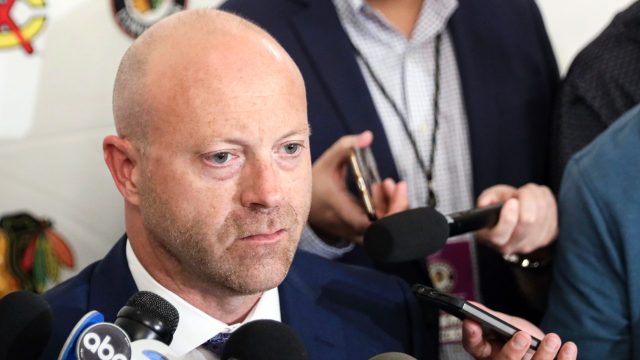
When Stan Bowman resigned from the Chicago Blackhawks in 2021, he began working with former NHLer Sheldon Kennedy and his organization, Respect Group, as part of the process to learn about the prevention of bullying, harassment, abuse and discrimination.
Three years later, Kennedy has expressed his support for Bowman in his new role as Edmonton Oilers general manager, but encouraged the 51-year-old to “walk the walk” going forward.
“When I talked to Stan, I said, ‘You’re not going to bluff your way through this. People don’t buy that stuff anymore. You’re going to have to walk the walk and you’re going to have to show people,’” Kennedy said, after Bowman’s introductory press conference with the Oilers on Wednesday. “This isn’t an endgame. He has to continually learn to be better in this space and lead by example.”
Bowman, along with Joel Quenneville and Al MacIsaac, were banned by the NHL from holding front office or coaching positions after an independent investigation revealed they had mishandled allegations of sexual assault raised by a former player, who later identified himself as Kyle Beach, regarding the team’s video coach Brad Aldrich in 2010.
They were reinstated by the league on July 1 and were able to sign with any team beginning on July 10.
Jeff Jackson, the Oilers’ CEO of hockey operations, said he consulted with Kennedy throughout the process and noted that Kennedy’s personal reflections on his work with Bowman, published on the Respect Group’s website, played a substantial role in his decision.
“When I talked to Sheldon a couple weeks ago, he gave a full endorsement of Stan’s work, his commitment — the fact that he’s sure that he learned from his mistakes,” Jackson said during his press conference with Bowman. “We wouldn’t have made this hire without knowing that Stan had done all that work.”
Kennedy, who went public with his experience with sexual abuse in 1996 and was subsequently released by the Calgary Flames, believes the only way for Bowman to fully earn back the trust of the public is for him to continue to do the work and be a leader in promoting a positive culture, on and off the ice.
“We have to do the work, and Stan is going to have to do the work,” Kennedy said. “We need to understand the big picture here. I think there is a commitment to change. Is it done? Absolutely not. But, is there acknowledgement of the impact on individuals? Absolutely. I think that, to me, that’s the starting point of, you know, moving forward.
“Don’t get that tunnel vision. These issues need to be prioritized, culture has to be prioritized, and I believe that he understands that.”